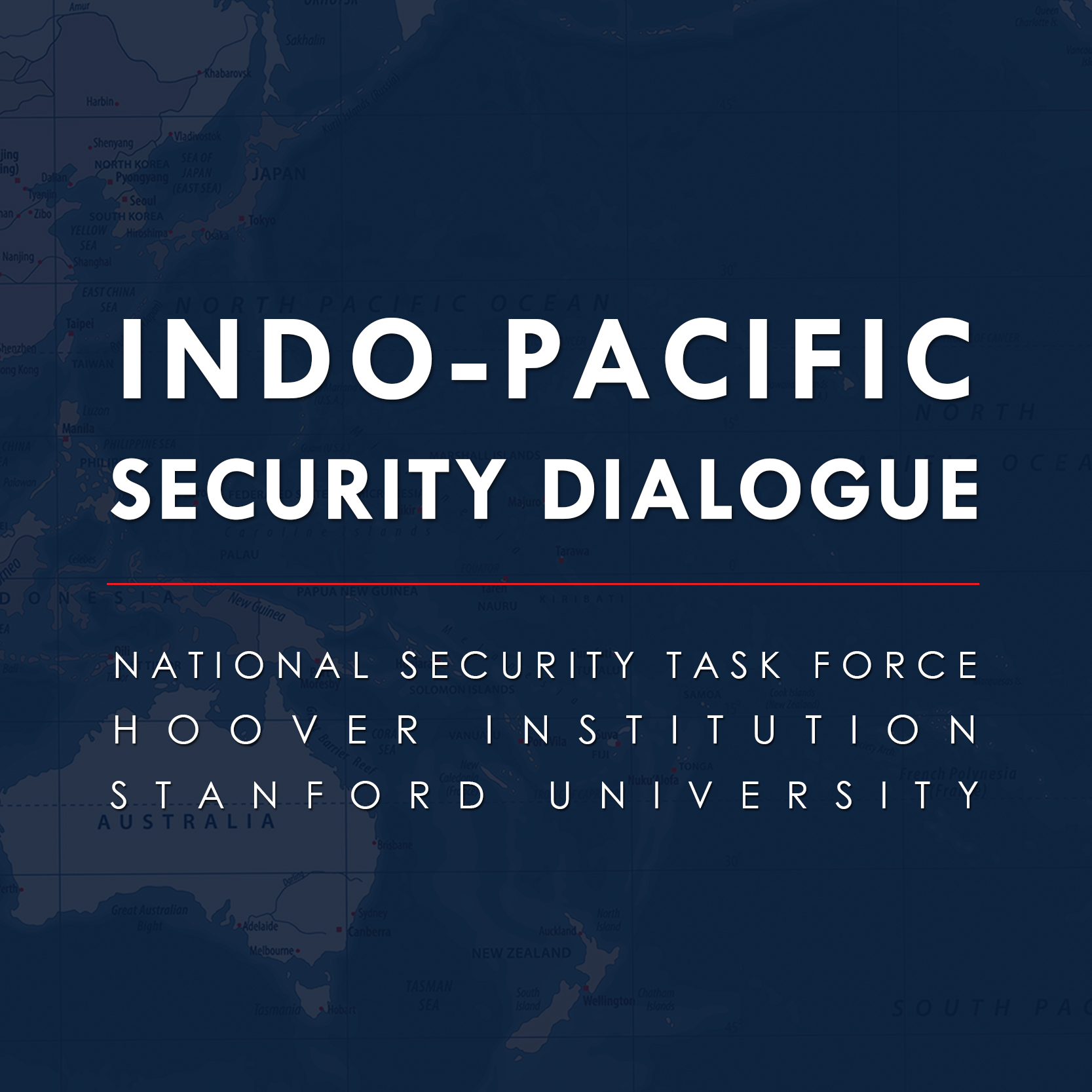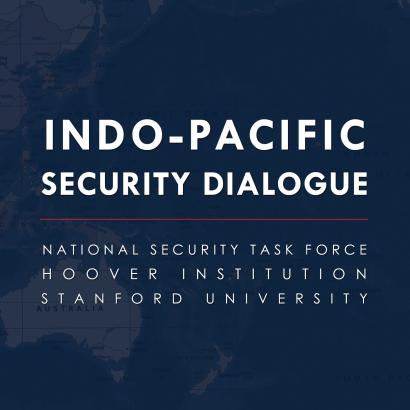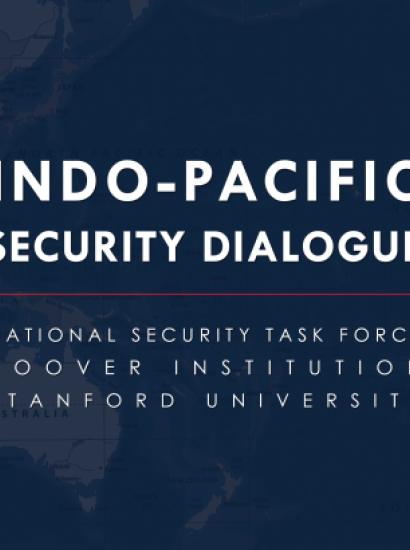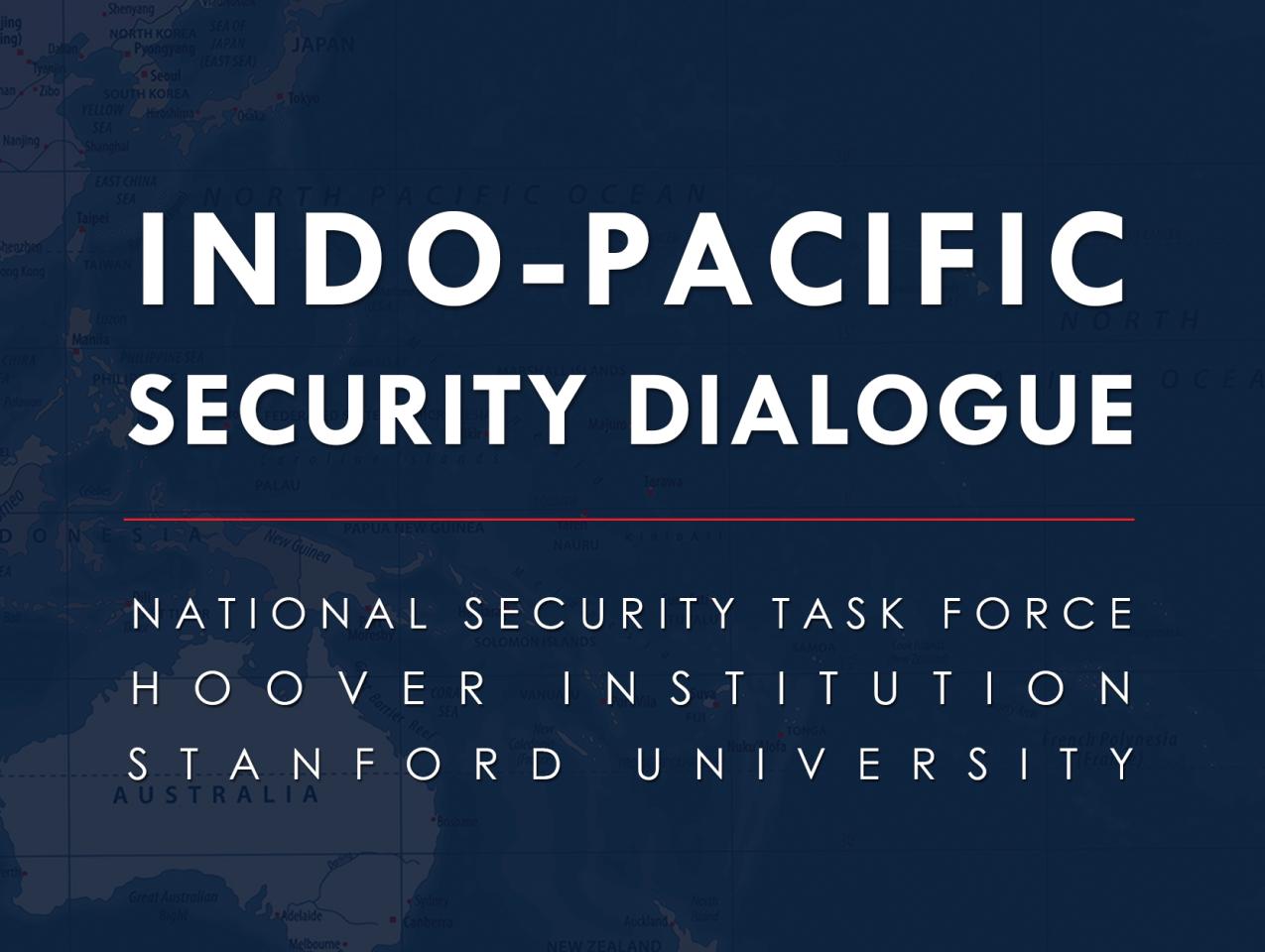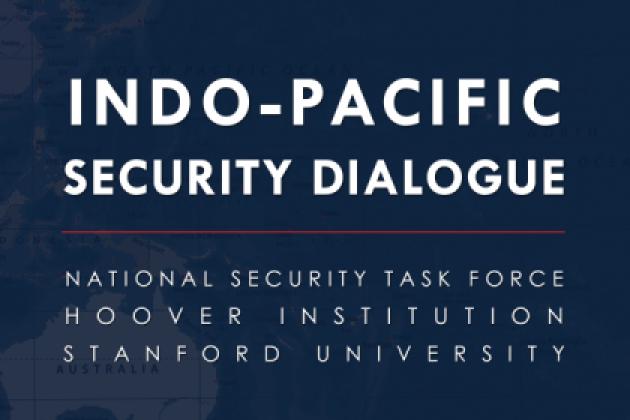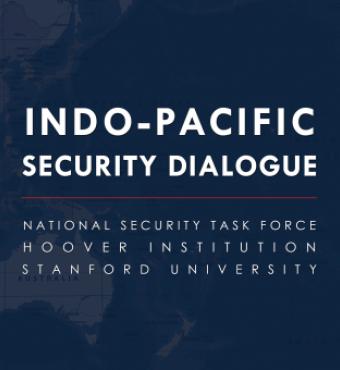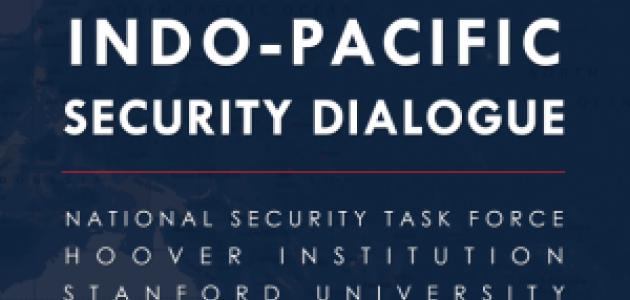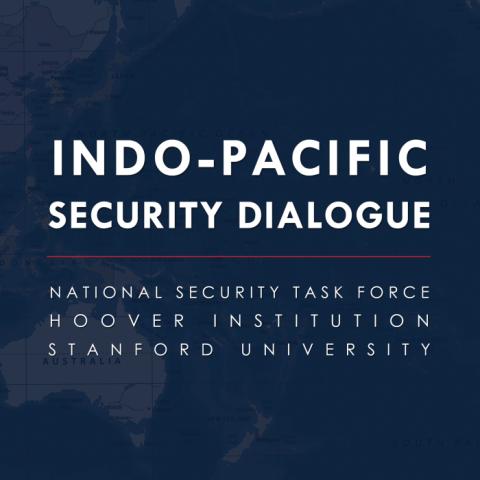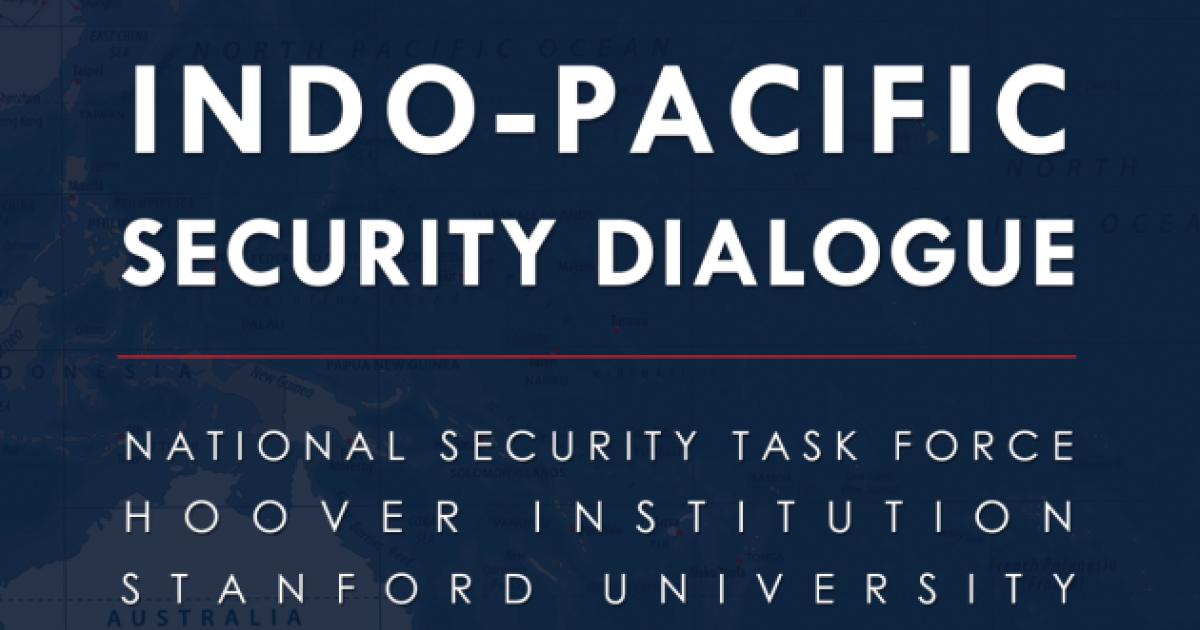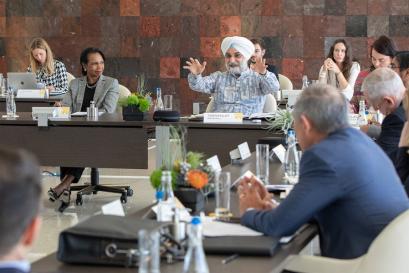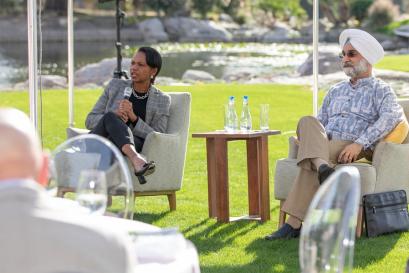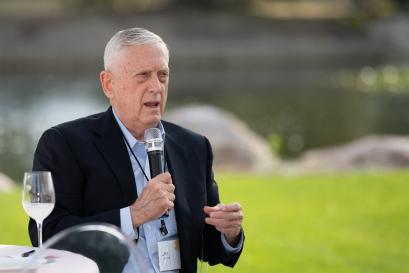By Jonathan Movroydis
Hoover fellows Joe Felter and Michael Auslin cochair the Indo-Pacific Security Dialogue, an off-the-record forum that enables government officials, scholars, business professionals, and other stakeholders to candidly discuss conditions and priorities in the Indo-Pacific region—a wide expanse that spans an area from the Pacific Coast of the United States to the East African shores of the Indian Ocean.
Felter and Auslin hosted seven meetings in 2021 with officials from Indo-Pacific countries—including Australia, India, Indonesia, and Japan—on a range of important policy issues, including technology transfers, defense cooperation, expansion of trade, and great-power competition with China.
In this interview, Felter, former deputy assistant secretary of defense for South and Southeast Asia, discusses the importance of security and stability in the Indo-Pacific region and what he and his Hoover colleagues hope to accomplish in their track 1.5 dialogue. He also describes the activity of the Quad (Quadrilateral Security Dialogue) framework of countries (United States, Australia, Japan, and India), their objective of maintaining a rules-based order in the Indo-Pacific, and how these large democracies can cooperate to counter Communist China’s aggression in the region.
The Hoover-led Indo-Pacific Security Dialogue capped its year of meetings with a conference among officials from the four Quad countries and the United Kingdom December 5-7 at Sunnylands, the Annenberg estate in Rancho Mirage, California. The historic venue has been the site of other such high-profile meetings as the summit between President Barack Obama and Chinese premier Xi Jinping in June 2013.
What do you hope to accomplish in Hoover’s Indo-Pacific Security Dialogue?
We want to create opportunities to increase dialogue between current and former government officials along with policy experts and academics from countries across the Indo-Pacific region. We address emerging challenges in the region via a trusted “safe space,” in what we call a track 1.5 environment. Topics discussed are based on conditions and emerging priorities in the region.
There are great initiatives in this space at other think tanks, both in the United States and abroad, but we believe Hoover is uniquely positioned to address certain aspects of challenges in the region. Being here in California, in the heart of Silicon Valley and close to the Pacific Ocean, I think makes Hoover an ideal institution to host this type of dialogue.
Who are some of the contributing fellows and scholars that are involved in this Hoover initiative?
My cochair in the dialogue is Michael Auslin, author of several noted books on the subject including The End of the Asian Century and Asia’s New Geopolitics. He is a respected expert on the Indo-Pacific region. We are situating this initiative under the umbrella of the Hoover National Security Task Force. Our own Secretary George P. Shultz was a great proponent of this task force, and James Ellis, James Mattis, and James Timbie are taking leading roles in establishing it. Across Hoover and Stanford as well, we have some great talent. This includes several other Asia experts, including Elizabeth Economy, Matt Pottinger, and Matthew Turpin. Larry Diamond also offers valuable perspectives about democratic trends in the region.
What geographic areas of the world does the Indo-Pacific cover, and what are some of the main challenges there, especially those crucial to US national security interests?
It is a vast region that encompasses the Pacific Ocean and Indian Ocean. Admiral Harry Harris, the former commander of Indo-Pacific Command and ambassador to South Korea, put it this way: “The Indo-Pacific extends from Hollywood to Bollywood, from polar bears to penguins.” This means from the West Coast of the United States across the Pacific Ocean and Indian Ocean, past India, to the shores of East Africa. It is a huge geographic expanse, which certainly presents significant challenges for the United States; thus, our policy makers must recognize that the US won’t be able to advance its interests unilaterally. It is really going to come down to how we can work with our allies and partners to protect all countries in the region, large and small, from their sovereignty being undermined, as well as to cooperate in so many critical areas for our mutual security and prosperity.
The twenty-first century will continue to be the Indo-Pacific century, if you want to consider that the previous century had a more Eurocentric focus. Sixty percent of all maritime trade passes through the Indo-Pacific. Thus, strengthening the strategic and economic frameworks between democratic nations in the region is crucial to America’s global competitiveness.
Our policy makers talk a lot about supporting a free and open Indo-Pacific region. What specifically does this entail, and how does it dovetail with American interests?
We want a region where the sovereignty of all countries large and small is protected. The US will exercise its right to fly, sail, and operate wherever international law allows and will encourage all countries to exercise these same rights across the region. We want to protect our bases and assets abroad as well as our access to free trade. We want a region where all countries play by the rules.
Certainly, I can point out many examples where countries are not respecting international law and are undermining the sovereignty of others. Most concerning, is of course, the People’s Republic of China (PRC) and its flagrant violations of international law—breaking the rules or trying to rewrite them in its own favor. Take for example China’s illegal claims and island-building campaign in the international waters of the South China Sea. Its claims have no basis in international law, and its efforts to build de facto military facilities on these former reefs and shoals are illegal. It regularly harasses and intimidates ships and fishing vessels from all countries in these international waters.
What are some current mechanisms and structures in place to abate China’s rule breaking and aggression, such as in the South and East China Seas?
It's a great question. There are international frameworks in which we can advance policies that are favorable to our security and economic interests. ASEAN (Association of Southeast Asian Nations) is a well-established body, and the nascent Quad group of democratic countries presents a unique opportunity to expand cooperation on various policy issues and areas including security, trade, and technology.
Some think of the Quad as a Pacific version of NATO. However, it's more accurately described as an informal grouping of countries that have shared values and interests and can work with a range of other allies and partners to advance common goals. The four large Indo-Pacific democracies can play to each of their own strengths. For example, some of the countries might approach issues such as Beijing’s aggression or the recent atrocities in Myanmar a little differently than the United States, based on their existing relationships and own histories within the region.
I think the more we are able to come together and have constructive dialogue on critical issues, the better we’ll be able to collaborate and partner to address them. As I mentioned before, this current Hoover initiative consists of track 1.5 dialogues that bring together currently serving and former officials along with academics and other subject matter experts. Sometimes official talks (track 1) can be constrained in terms of how much or little is allowed to be discussed. Our goal is to promote transparency, trust, and understanding between all parties. Thus, Hoover-led conversations are off the record so that participants can be as candid as they would like.
We have had sessions throughout the year with leaders from Australia, India, Indonesia, and Japan on a range of issues, including cooperation on defense and technological innovation and competing effectively against the People’s Republic of China. This series culminated in a meeting to discuss regional security challenges and opportunities for cooperation with representatives from the Quad countries.
What are some of the biggest challenges to security in the Indo-Pacific region?
A nuclear-armed North Korea must be right at the very top. Less of an Armageddon-like threat, but certainly a cause of serious concern are China’s threats on Taiwan. Additionally, in the South and East China Seas, China is explicitly violating international law by building out concrete islands from reefs and outcroppings in the water. In a region as big as this, there are of course other major challenges with global implications, including the impact of rising sea levels from climate change and the proliferation of infectious diseases like COVID-19.
China is the United States’ biggest competitor in the Indo-Pacific. Certainly, we don't wish to have conflict with China. We should cooperate wherever we can, e.g., in areas like nuclear security, the global pandemic, climate change, and other issues where we have mutual interests. However, in its competition with us, China has made substantial gains at our expense and that of our allies and partners. We must compete in these areas and not cede important advantages to China.
I believe that the United States has a comparative advantage over China in terms of our ability to expand and strengthen our network of allies and partners. In promoting freedom and the rule of law, the United States offers an attractive vision to the rest of the world. By contrast, China demonstrates coercive behavior, not only to its citizens but also in international organizations and in its relationships with other countries.
Just look at the way Beijing has treated Uighur Muslims in Xinjiang Province and the people of Hong Kong. Look at the way it has threatened Taiwan. Based just on this and other concerning evidence, I think most of the countries in the Indo-Pacific region conclude that it is not in their interests for China to become the dominant geopolitical power.
Can the United States, through its dense network of alliances in the Indo-Pacific, effectively push back against China’s aggressive behavior, for example in Taiwan?
America’s major comparative advantage in all facets of its strategic competition with China is its dense network of alliances and partnerships. The United States has five separate bilateral alliances in the region, with Japan, South Korea, Australia, Thailand, and the Philippines. We also have close security partnerships with countries including Singapore. We will be more effective—and efficient—advancing and protecting all of our important interests in the region if we work as closely as possible with our allies and partners. This includes preventing the forced annexation of Taiwan by the PRC.
Since the 1970s, we have kept a position of “strategic ambiguity” about what our reaction would be if China were to invade Taiwan. We make clear in the 1979 Taiwan Relations Act that the US will provide Taiwan the military equipment it needs to defend itself. But we stop short of guaranteeing our military response. Many argue that China will invade Taiwan when it is confident that it can succeed and can do so at an acceptable cost. There is a range of opportunities for our allies and partners to help raise the PRC’s perceived costs of invading Taiwan, e.g., through economic and diplomatic means.
I think Xi Jinping in some ways anticipates that China may be reaching the apex of its power. Not long before he passed away, George Shultz wrote a great op-ed in the Wall Street Journal, emphasizing the demographic challenges China is facing. It has had a strong economy for a long time, but now it's on shaky ground because its population is aging and labor force is shrinking. China may think now that it has a narrowing window of opportunity to consolidate some of its gains. If China believes that it may be in a weaker position a few years down the road with respect to Taiwan, the risk may increase that it will attempt to forcibly seize the island.
Could you talk about our Quad partners and what each contributes to supporting a free and open Indo-Pacific Region?
Japan has incredibly constructive relationships with so many countries in the region. They are also a formidable economic powerhouse that can help provide alternative investment options to developing countries, especially as China has undertaken its ambitious Belt and Road Initiative, which provides financing for infrastructure and other projects, often with costly strings attached.
Australia has a capable military that is highly interoperable with the United States and is a “Five Eyes” member [an intelligence alliance consisting of the United States, the United Kingdom, Australia, Canada, and New Zealand] with whom we can readily share classified information. It is well situated in helping protect and advance the interests of ASEAN as well as New Zealand and other Pacific island countries such as French Polynesia, Fiji, Samoa, Papua New Guinea, and the Solomon Islands. Of note, its recent AUKUS trilateral agreement with the US and UK to cooperate in developing a nuclear submarine capability is a major development and an investment in bolstering its security posture in the region.
While India is not an ally, it is a billion-strong democracy, and its voice can resonate differently among countries than that of formal allies of the United States—not just in the region but globally as well. India’s growing military and economic power, along with its relationships and influence in the Indian Ocean region, make it an extraordinarily capable partner in maintaining a free and open region.
All these sovereign countries share similar principles, but each offers a distinct value to the Quad framework based on its culture, history, and geographic location.
What are the advantages of supporting the Quad as an informal framework versus a formal alliance?
I don't think a formal alliance is necessary to leverage the potential of greater cooperation among the region’s largest democracies. India, for one, has a long history of being fiercely independent and has been part of the nonaligned movement of nation-states since 1961. It would be a stretch for India to gain domestic support for entering into a formal alliance, although recent aggressive actions by China on its border underscore the importance to India of security cooperation with its partners.
The Quad should not be viewed as an exclusive club of four large democracies. Rather, it should be aimed at facilitating greater cooperation among all countries in the Indo-Pacific that have shared interests in the maintenance of regional stability and enforcement of international law.
If the Quad moves toward a formal alliance, I think it could potentially limit the participation of several countries. You might also see some early defections by India and others who wouldn't want to be constrained by an alliance or treaty obligations.
As an informal structure, I think there are a lot of great opportunities for maritime security cooperation, e.g., between navies in freedom of navigation operations. That will be asking a lot of some smaller countries, but I think their confidence level can be raised as these large states in the region begin to work more closely on big issues such as technology, defense, public health, and climate change mitigation.
On September 24 of this year, the Quad held its first-in-person meeting. What was discussed, and was there anything significant accomplished?
The fact that the leaders of Australia, India, Japan, and the US met in person at the White House in September to discuss opportunities for greater cooperation is significant in itself. A meeting at the head-of-state level would have been considered a reach objective just a few years ago. Topics discussed included Quad cooperation in COVID and global health; infrastructure; climate; people-to-people exchanges and education; critical and emerging technologies; cybersecurity; and space.
Is there a place for China in this dialogue about the security and prosperity of the Indo-Pacific region?
Absolutely. The price of admission is playing by the rules and respecting other countries' sovereignty. I think the end game in this competition between the United States and China is to create incentives and disincentives for Beijing to change its behavior.
After the Cold War, a consensus developed among American policy makers called the “responsible stakeholder theory.” It held that as China's economy grew, it was going to liberalize politically and eventually become a “responsible stakeholder” within the international community. On this assumption, we looked the other way when China repressed its own citizens and we allowed it to join international bodies like the World Trade Organization.
But the Communist Party has defied all expectations and has remained firmly in control of the country.
So, when you ask, "Is there a place for China?" Yes, there is, but their entry can’t be based on the flawed assumptions that I just explained. We have to treat China for who it is and not who we want it to be. China must first prove that it will be a responsible actor, work within the rules of international law, and realize that its aggressive behavior is not sustainable.
How can the Indo-Pacific Security Dialogue contribute to peace, stability, and openness in the Indo-Pacific region?
I traveled the region from 2017 to 2019 as the deputy assistant secretary for South and Southeast Asia. Many of the defense and other government officials I met with acknowledged publicly that there was a decline in American leadership and that China’s influence was on the rise. This was, of course, a narrative promulgated by Beijing at our expense. However, these same officials would make clear in private conversations that there was a thirst for continued American leadership and presence in the region. They were reluctant to choose between the US and China outright but clearly appreciated that the US had a shared vision for the future of the region that they could embrace versus China’s alternative vision, which would have to be coerced and imposed.
Through the Quad and other forums of multilateral cooperation, such as our track 1.5 initiative here at Hoover, we can identify greater opportunities for collaboration and partnership that will help these countries advance—and ultimately realize—their vision for a free and open Indo-Pacific region.
See photos below of the Hoover led Indo-Pacific Security Dialogue at Sunnylands, the Annenberg estate in Rancho Mirage, California on December 5-7, 2021







